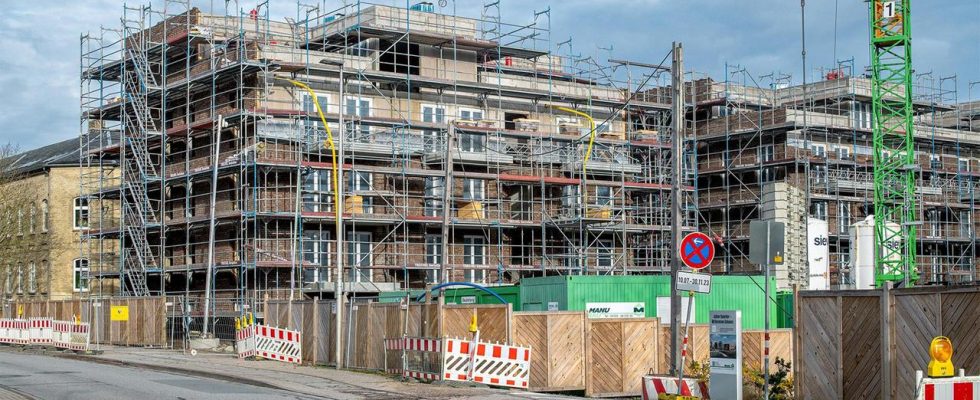The number of building permits for new apartments fell more slowly in October than in previous months. At a loss of 11.5 percent, the decline is nevertheless considerable.
The number of building permits for new apartments fell significantly more slowly in October than in previous months. The Federal Statistical Office announced that it fell by 11.5 percent compared to the same month last year to 22,500. This is the “weakest decline so far this year”. From January to October there was a decrease of 26.7 percent to 218,100 apartments. This corresponds to 79,300 fewer than a year earlier.
When looking at the individual construction segments, there was a 38.2 percent decline in building permits for single-family homes from January to October to 41,400. The number of two-family homes fell by 50.5 percent to 12,200. The number of approvals also fell significantly by 25.2 percent to 118,300 for the type of building with the most apartments, multi-family houses. Only in residential homes there was an increase of 24.0 percent to 7,900.
High construction costs and poor financing conditions are currently crippling the construction industry. “Residential construction is collapsing by eleven percent in real terms this year and will continue its decline in 2024 with minus 13 percent,” the President of the Central Association of the German Construction Industry (ZDB), Wolfgang Schubert-Raab, recently said. For the year 2024, the German construction industry is expecting the loss of around 30,000 jobs for the first time in many years.
700,000 apartments are missing
According to the data, the situation did not improve at the end of the year. “The construction industry remains in crisis, orders are falling off in particular for residential construction,” said ifo expert Klaus Wohlrabe about his institute’s December company survey. “The lack of orders continues to worsen.” The reason for this is the increased interest rate level.
The German Institute for Economic Research (DIW) emphasized that “housing prices also remain at a very high level despite price increases calming down, making financing even more difficult.” Therefore, “further significant declines in residential construction investments are to be expected” in the coming quarters. According to the German Tenants’ Association, there is already a shortage of 700,000 apartments.
The federal government originally set itself the goal of 400,000 apartments annually in order to meet the growing demand, especially in large cities. According to experts, it will miss this target again next year.
Housing vacancies in Germany falls significantly
Meanwhile, due to the high demand for living space, fewer and fewer apartments are vacant in the wake of the Ukraine war – with consequences for rents. This is shown by an analysis by the consulting institute Empirica and the real estate specialist CBRE. Accordingly, the “market active vacancy rate”, i.e. apartments that can be rented out immediately or activated in the medium term, was estimated at 2.5 percent or around 554,000 residential units at the end of 2022. This is a decrease of 53,000 compared to the previous year.
Empirica board member Reiner Braun spoke of the biggest decline in more than 20 years. “The vacancy development in 2022 was characterized by the immigration of around one million people from Ukraine,” it said. Since the refugee movement is much more evenly distributed across the country than previous immigration, for the first time there is not an increase in vacancies in any of the 400 districts.
The situation is likely to get worse by 2025. Immigration from abroad has calmed down. But the number of completed apartments will collapse with a delay due to the increase in interest rates and construction costs. This means that further shortages and, as a result, further rent increases are programmed.

